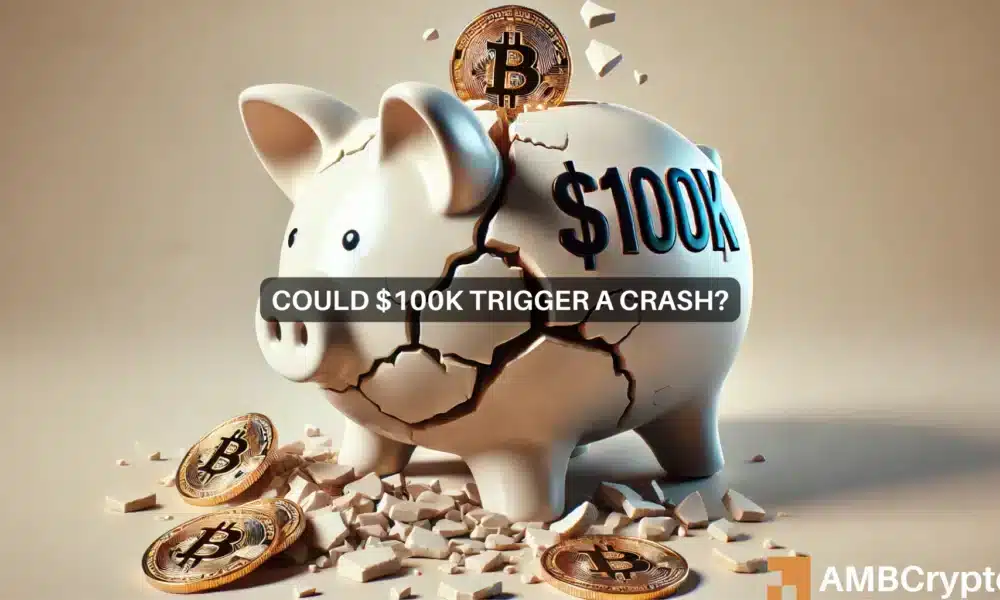Bitcoin
Is Bitcoin going to crash soon? BTC’s $100K in limbo as FOMO fades
Historically, gold and the U.S. dollar are the strongest “safe-haven” contenders during Bitcoin or general market crashes.

- Is Bitcoin going to crash? Multiple factors pointing towards it as BTC approaches $100K.
- A return of FOMO could be essential to reversing the trend.
Extreme greed is topping the fear and greed index, mirroring the March surge when Bitcoin [BTC] hit $73K, only to crash to $67K within five days due to selling pressure and a lack of confidence in a sustained rally.
Unlike that cycle, this one is marked by more consistent green candlesticks on the daily chart, with a 3% daily high at a price range usually seen as ‘too risky.’
This indicates that investors are embracing risk for outsized returns, keeping the bears in check and $100K within reach. However, the possibility of a ‘crash’ still cannot be ruled out.
FOMO, a crucial catalyst that fuels new interest in the cycle, will likely start to fade once BTC hits $100K, as the price range becomes too unaffordable for many to enter.
Could this create conditions ripe for a potential correction ahead?
Will Bitcoin continue as the safe-haven?
As uncertainty over regulatory policies grows amid concerns around national debt, the new administration may introduce measures addressing these issues, potentially leading to inflationary pressures as fiscal deficits increase.
In this climate, Bitcoin’s appeal as a “safe-haven” could be tested once again.
While a significant tax cut might counterbalance these effects, its likelihood appears slim given the hefty trillion-dollar interest obligations already on the books.
In the long term, these policies could play a central role in shaping Bitcoin’s next price range. A potential ‘crash’ might occur if investors pivot back to lower-risk assets.
Interestingly, since the recent election results, the Bitcoin/Gold ratio has peaked around 35, marking a yearly high. This ratio signifies that Bitcoin’s value is now roughly 35 times that of gold.
Typically, a higher ratio reflects increased confidence in Bitcoin as a store of value, which aligns with Bitcoin’s 9% price jump on the day of the election results, outperforming most asset classes.
However, considering the ongoing economic uncertainty, this trend could reverse. Investors might shift back to gold, viewing it once again as a hedge against inflation.
If this scenario unfolds in the coming days, Bitcoin could crash, potentially dipping back to the $70K range. Therefore, we should closely monitor these developments.
Is Bitcoin going to crash as investors diversify?
With triple-digit weekly gains, many memecoins are posting higher highs compared to Bitcoin, a trend that typically signals a market top.
It looks like retail investors are jumping from Bitcoin to memecoins, likely because they’re cheap and more enticing, often costing less than a buck.
This trend lines up with AMBCrypto’s earlier thoughts on FOMO. On one hand, as Bitcoin approaches $100K, rising selling pressure is expected.
On the other hand, investors might diversify into other assets, reducing Bitcoin’s overall appeal and lessening the fear-of-missing-out.
That FOMO will likely return, though, when Bitcoin drops to a level that traders view as a potential “dip”, making the likelihood of a crash more solid.
Where could the next dip happen?
Looking at a 12-hour chart, a strong liquidity pocket around $89K shows a risk zone, with around $63 million in positions potentially at risk of liquidation.
This aligns with the recent bullish dominance over the past week, where a significant influx of long positions has propelled Bitcoin to surge more than 20%, hitting $91K at the time of writing.
Read Bitcoin’s [BTC] Price Prediction 2024–2025
However, considering the ongoing institutional shifts and financial restructuring, Bitcoin’s long-term potential remains uncertain.
As a result, a crash could be imminent once BTC hits $100K, with traders likely shifting focus to other assets, awaiting FOMO to re-enter the market.

